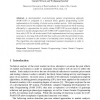Free Online Productivity Tools
i2Speak
i2Symbol
i2OCR
iTex2Img
iWeb2Print
iWeb2Shot
i2Type
iPdf2Split
iPdf2Merge
i2Bopomofo
i2Arabic
i2Style
i2Image
i2PDF
iLatex2Rtf
Sci2ools
126
click to vote
EVOW
2009
Springer
2009
Springer
Prediction of Interday Stock Prices Using Developmental and Linear Genetic Programming
A developmental co-evolutionary genetic programming approach (PAM DGP) is compared to a standard linear genetic programming (LGP) implementation for trading of stocks across market sectors. Both implementations were found to be impressively robust to market fluctuations while reacting efficiently to opportunities for profit, where PAM DGP proved slightly more reactive to market changes than LGP. PAM DGP outperformed, or was competitive with, LGP for all stocks tested. Both implementations had very impressive accuracy in choosing both profitable buy trades and sells that prevented losses, where this occurred in the context of moderately active trading for all stocks. The algorithms also appropriately maintained maximal investment in order to profit from sustained market upswings.
| Added | 19 May 2010 |
| Updated | 19 May 2010 |
| Type | Conference |
| Year | 2009 |
| Where | EVOW |
| Authors | Garnett Carl Wilson, Wolfgang Banzhaf |
Comments (0)

